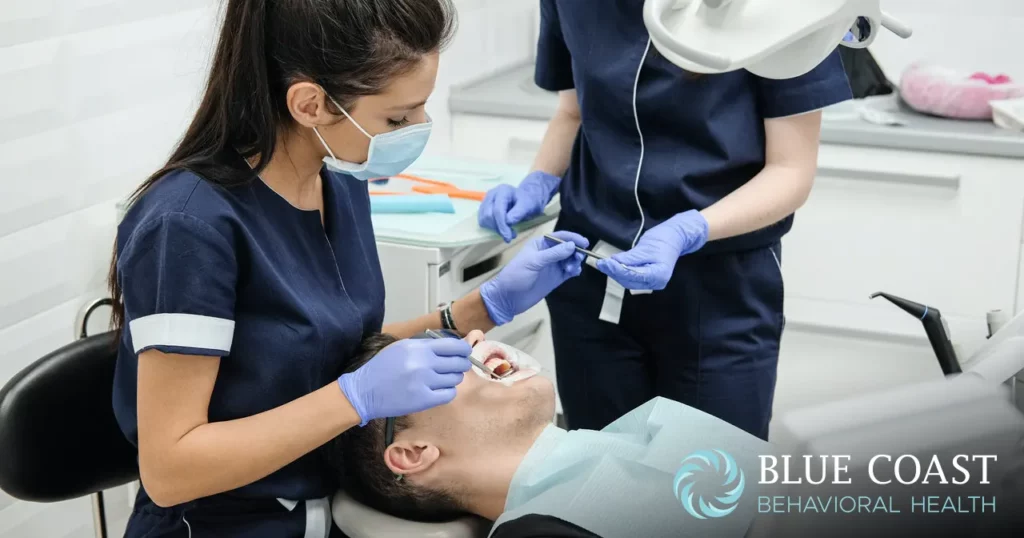The opioid epidemic continues to ravage the lives of individuals and families alike in the United States. Fatal overdoses reached a record high in 2021 due to the proliferation of the dangerously potent pharmaceutical-grade opioid fentanyl. But many individuals struggling with opioid addiction have found respite in medication-assisted treatment. Also known as MAT, this approach to treating opioid dependency typically involves some combination of buprenorphine and/or naloxone. These two drugs come in many prescription forms. One of the most popular MAT prescriptions for treating opioid addiction is known as Suboxone. Suboxone serves the same purpose as the more well-known alternative methadone. Suboxone is a daily medication that individuals take that block the effects of other opiates while managing cravings. Unfortunately, the FDA released a warning in early 2022 that people using the sublingual film version should remain wary of Suboxone dental problems caused by the medication.
FDA Warning About Suboxone Dental Problems
The official announcement reported by the FDA included the following advisory regarding Suboxone dental problems:
Dental problems such as tooth decay, cavities, oral infections, and loss of teeth have been reported with buprenorphine medicines that are dissolved in the mouth to treat opioid use disorder (OUD) or pain. These problems, some of which have been serious, have been reported even in patients with no history of dental issues. Despite this, the benefits of buprenorphine medicines clearly outweigh the risks. Other cases reported requiring root canals, dental surgery, and other procedures such as crowns and implants.
Since the January 2022 announcement released so recently, many individuals taking Suboxone began treatment while unaware of its potential dental side effects. The FDA also clarified several other data reports regarding sublingual Suboxone-related dental problems:
- 305 cases reported dental problems (131 classified as serious) associated with buprenorphine medicines dissolved in the mouth
- Of the 305 cases, 113 mentioned two or more teeth affected
- Average age of patients reported at 42 years, but those as young as 18 years also affected
- Most used Suboxone for opioid use disorder, but 28 used the medication for pain
- In 26 cases, patients had no prior history of dental problems
- Dental problems reported as soon as 2 weeks after starting treatment
- Median time to diagnosis was approximately 2 years since treatment began
- Tooth extraction/removal reported in 71 cases
Physician-Recommended Actions
Despite these potential side effects, buprenorphine prescriptions remain one of the most successful treatments for opioid use disorder. Statistically it offers the some of the best long term outcomes when compared to other treatments. So the FDA recommends that individuals continue taking any medications as prescribed by their physician with a few extra steps.
First, individuals should schedule an appointment with their dentist as soon as possible after any addiction-medicine physician prescribes sublingual Suboxone. Individuals should also inform their dentist of the prescription, request a tooth decay prevention plan, and maintain regular dental checkups.
The FDA also recommends individuals take a large sip of water after the Suboxone film is completely dissolved. Swish the water around the teeth and gums gently and then swallow. To protect tooth enamel, individuals should wait at least one hour before brushing teeth. By combining these daily routine steps with regular dental care, individuals protect themselves from unnecessary tooth decay while using sublingual Suboxone.
Medication-Assisted Treatment
While these Suboxone dental problems certainly present complications, experts agree that MAT’s critical benefits far outweigh these side effects. Opioid use disorder claims more lives year over year at an alarming pace. So MAT’s efficacy for many of those suffering with opioid use disorder is not something to be taken lightly. Individuals should always consult with their physicians before making any changes in their medication routines.
If you or someone you love is suffering from a substance abuse disorder, our behavioral health counselors are available 24/7 by phone: 714-203-2708




